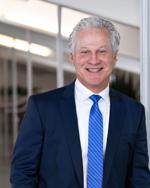Americans living with diabetes are sometimes forced to pay $350 for a vial of lifesaving insulin. But a nonprofit pharmaceutical company coming to Petersburg plans to sell the medicine at no more than $30 a vial.
The nonprofit, Civica Inc., is nearing completion on a 140,000-square-foot facility in the city’s southeast corner and plans to begin selling vials and pre-filled syringes by 2024.
Because Civica is a nonprofit, it can take risks for-profit companies wouldn’t attempt, said the company’s CEO, Ned McCoy.

Vastly cheaper insulin would improve the lives of roughly 8 million Americans who depend on insulin to survive. Many of them ration their supply because of the high cost.
“I think it’s going to be transformative,” said Aaron Kowalski, CEO of the Juvenile Diabetes Research Foundation.
In the United States, insulin costs about eight times more than in other high-income countries. The price is driven up by middlemen known as pharmacy benefit managers, Kowalski said, who negotiate with the manufacturer for the best price.
The middlemen profit when the manufacturer raises the retail price and offers the insurance company a greater discount. Manufacturers are willing to do this in order to move ahead of their competition on insurance companies’ drug lists.
While this problem plagues many drugs, Kowalski said, insulin has become the poster child for overpriced medication because people with Type 1 diabetes can’t survive without it.
Frustrated by high prices and medicine shortages, a group of hospitals and philanthropic organizations formed Civica in 2018, hoping to wrest back control of the drug market.
Utah-based Civica provides about 60 generic medicines to more than 1,500 hospitals across the country. It chose Petersburg for its insulin operation in part because Civica’s mission overlaps with the other pharmaceutical groups nearby, including Virginia Commonwealth University’s Medicines for All, which aims to reduce the price of essential medicines, and Phlow Corp., which is building a national stockpile of drugs. The organizations have formed a coalition called the Alliance for Building Better Medicine.
The Petersburg plant, which is expected to bring 186 jobs, will begin producing finished insulin products in the third quarter of 2023 and should begin selling in 2024.
The insulin itself will come from an India-based manufacturer, GeneSys Biologics. Once it arrives in Petersburg, it will be sterilized, packaged and distributed.
Civica will make generic versions of the three most popular brands of insulin — Lantus, Humalog and Novolog, which account for more than 80% of the U.S. market. Patients with prescriptions to these brands can switch to the Civica versions, McCoy said.
They’ll cost no more than $30 a vial and $55 for a box of pre-filled pens, which often retail for over $500. The Petersburg plant will be capable of producing up to 90 million vials and 50 million pens per year — enough to supply all the vials and one-third of the pens used in the United States.
Building cheaper insulin isn’t as easy as building a cheaper version of Tylenol.
Insulin isn’t a molecule like acetaminophen. It’s a protein, and building a generic version, known as a biosimilar medicine, is complex and expensive. Civica’s insulin initiative cost $125 million.
Once the biosimilar insulin is made, it must be approved by the Food and Drug Administration. After approval, Civica has to compete against three stalwart drug companies that have dominated the market for decades.
This would be a risky investment for a for-profit company, McCoy said.
As a nonprofit, Civica has no shareholders demanding a return on their investment. Its funding comes from hospitals — including Richmond-heavyweight HCA Healthcare, insurance companies, nonprofits and governments.
“A lot of folks are very interested in fixing this market,” McCoy said.
Read more here.